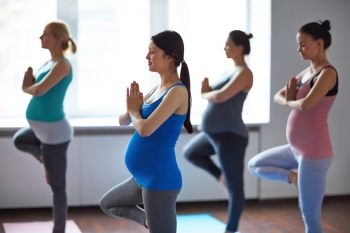As the baby grows, expectant mothers may experience sensations such as lightening and quickening in pregnancy. Lightening refers to the baby dropping lower into the pelvis, while quickening is the first movements felt by the mother.
While these sensations are normal and a sign of a healthy pregnancy, they can also be uncomfortable and even painful at times.
At kingdomofbaby, we understand the importance of providing valuable information to expectant mothers on how to alleviate discomfort during lightening and quickening.
In this article, we will explore some effective tips and techniques that can help ease the discomfort and allow you to enjoy this special time in your life.
Understanding Lightening and Quickening During Pregnancy
Lightening and quickening are two sensations that occur as a woman’s body prepares for childbirth.
Lightening, also known as the baby “dropping,” occurs when the baby moves lower into the pelvis in preparation for birth.
This typically happens in the final weeks of pregnancy, although it can occur earlier for some women.

Quickening is the first movements felt by the mother as the baby becomes more active in the uterus. These movements can range from small flutters to more noticeable kicks and rolls.
It is important to note that lightening and quickening are normal and healthy parts of pregnancy.
However, they can also cause discomfort and pain, which is why it is important to know how to ease these sensations.
Common Discomforts During Lightening and Quickening
As the baby drops lower into the pelvis, it can put pressure on the bladder, causing frequent urination.
This can be particularly uncomfortable at night, as it can disrupt sleep. Additionally, the pressure on the pelvis can cause aches and pains in the lower back and groin area.

This discomfort can be magnified during activities such as walking or standing for long periods of time. As the baby becomes more active during quickening, it can cause discomfort as well.
The movements can be strong and sudden, which can be surprising and even painful for some women. Additionally, the baby’s movements can put pressure on the ribs and internal organs, causing discomfort and even difficulty breathing.
Home Remedies for Easing Discomfort
There are several home remedies that can help ease discomfort during lightening and quickening. One of the most effective is to take frequent breaks and rest as needed.
This can help reduce the pressure on the pelvis and allow the body to relax and recover. Additionally, taking warm baths or using a heating pad on the lower back can help ease discomfort and reduce tension.
Gentle stretching and exercising can also be helpful, as it can help improve circulation and reduce tension.

Pelvic tilts, squats, and gentle yoga poses can all be effective in easing discomfort during lightening and quickening.
Additionally, staying hydrated and eating a healthy diet can help reduce inflammation and improve overall comfort.
Tips for Managing Pain During Lightening and Quickening
If you are experiencing pain during lightening and quickening, there are several tips that can help manage it.
One of the most effective is to change positions frequently. This can help reduce pressure on specific areas and allow the body to find a more comfortable position.
Additionally, using a pregnancy pillow or body pillow can provide support and reduce discomfort.

If the pain is particularly severe, over the counter pain relievers such as acetaminophen may be helpful.
However, it is important to consult with your healthcare provider before taking any medications during pregnancy.
When to Seek Medical Attention
While lightening and quickening are normal and healthy parts of pregnancy, there are certain symptoms that should not be ignored.
If you experience severe or persistent pain, bleeding, or a change in fetal movement, it is important to seek medical attention immediately. These symptoms could indicate a more serious issue that requires medical intervention.
Exercises and Stretches for Easing Discomfort
There are several exercises and stretches that can be effective in easing discomfort during lightening and quickening.
Pelvic tilts are one of the most effective, as they can help strengthen the muscles in the lower back and pelvis. To perform a pelvic tilt, lie on your back with your knees bent and feet flat on the ground.
Slowly tilt your pelvis forward and backward, bringing your lower back up and then down. Squats can also be effective in easing discomfort during lightening and quickening.
Stand with your feet shoulder-width apart and slowly lower your body down as if you are sitting in a chair. Hold for a few seconds and then slowly stand back up.

Gentle yoga poses such as child’s pose and downward dog can also be effective in easing discomfort and improving circulation.
Comfortable Clothing and Accessories
Wearing comfortable clothing and accessories can also help ease discomfort during lightening and quickening.
Maternity support belts can provide extra support to the lower back and pelvis, reducing discomfort and pain.

Additionally, wearing loose-fitting clothing can help reduce pressure on the belly and allow for more comfortable movement.
Alternative Therapies for Managing Discomfort
There are several alternative therapies that can be effective in managing discomfort during lightening and quickening. Acupuncture has been shown to reduce pain and improve relaxation during pregnancy.

Additionally, chiropractic care can help improve spinal alignment and reduce pressure on the nerves and muscles in the pelvis.
Massage therapy can also be effective in reducing tension and improving circulation. It is important to choose a therapist who is trained in prenatal massage and understands the specific needs of pregnant women.
Support Groups and Resources for Pregnant Women
Finally, it is important to remember that you are not alone during this time. There are many resources and support groups available for pregnant women, which can provide valuable information and emotional support.
Online forums and social media groups can be a great way to connect with other expectant mothers and share experiences and advice.
Additionally, healthcare providers and doulas can provide valuable resources and support throughout your pregnancy journey.

Lightening and quickening are normal and healthy parts of pregnancy, but they can also be uncomfortable and even painful at times.
By understanding these sensations and knowing how to manage and ease discomfort, you can enjoy this special time in your life.
From home remedies to alternative therapies, there are many effective ways to reduce discomfort and improve overall comfort during lightening and quickening.
Remember to seek medical attention if you experience any severe or persistent symptoms, and to connect with other pregnant women and resources for support and information.


